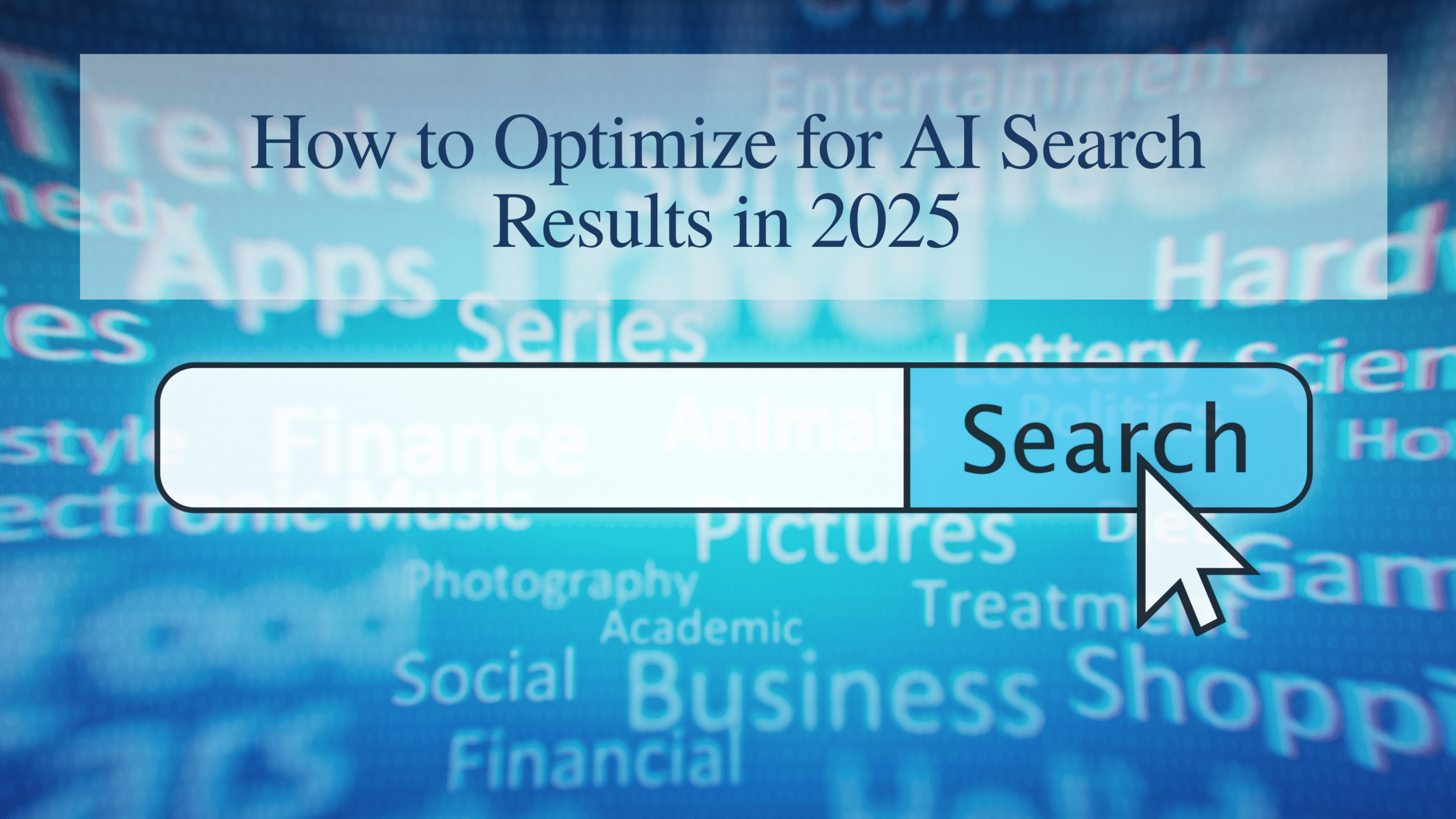The way we search for information is evolving rapidly. With artificial intelligence (AI) powering search engines and digital assistants more than ever, optimizing for AI search results in 2025 requires a fresh approach. If you want your website or content to stay visible and competitive, understanding AI-driven search is key.
In this guide, we’ll break down everything you need to know to optimize your online presence for AI search results in 2025 — in a user-friendly way, perfect for marketers, business owners, and content creators alike.
What is AI Search and Why Does It Matter?
Before diving into optimization tips, let’s clarify what AI search means.Traditional search engines like Google rely on keywords and links to rank pages. AI search engines, however, use advanced machine learning, natural language processing (NLP), and understanding of user intent to deliver smarter, more relevant answers.
Key features of AI search:
- Contextual understanding: AI can grasp the context behind your query, not just the keywords.
- Voice and conversational search: AI assistants like Siri, Alexa, and Google Assistant interpret voice queries in natural language.
- Personalization: AI tailors results based on user behavior, preferences, and location.
- Multimodal search: AI can interpret images, videos, and text simultaneously.
Why optimize for AI search?
By 2025, AI search will dominate how people find information. Optimizing your content for AI means:
- Higher chances of appearing in rich, featured, or zero-click snippets.
- Better ranking on voice and conversational search results.
- Increased organic traffic from smarter search algorithms.
- Improved user engagement and conversion rates.
Top 7 Strategies to Optimize for AI Search Results in 2025
Focus on User Intent and Contextual Content
AI search prioritizes understanding why users are searching, not just what they type. This means you need to create content that answers specific questions and fulfills clear user needs.
How to do this:
- Conduct thorough keyword research with a focus on search intent (informational, transactional, navigational).
- Use topic clusters around core themes rather than isolated keywords.
- Answer common questions clearly and directly within your content.
- Use conversational language that mimics how people ask questions.
Optimize for Natural Language and Voice Search
Voice and conversational searches are booming. AI assistants process queries that are longer, more conversational, and question-based.
Tips:
- Incorporate long-tail keywords and natural phrases.
- Free Initial Consultation
- Custom Solution Planning
- Expert Team Support
- Create FAQ sections answering typical voice queries (Who? What? When? Where? Why? How?).
- Write in a conversational tone to match voice search patterns.
- Use schema markup to highlight questions and answers for better indexing.
Transform Your Digital Presence
Get personalized strategies and solutions tailored to your business needs.
Leverage Structured Data and Schema Markup
AI search engines heavily rely on structured data to understand your content better and display rich results like snippets, knowledge panels, and carousels.
What to do:
- Implement schema.org markup for your website content (articles, products, events, FAQs).
- Use JSON-LD format for easier integration.
- Highlight key information such as ratings, reviews, author, date published.
- Validate your structured data with Google’s Rich Results Test tool.
Improve Content Quality and Depth
AI algorithms reward content that demonstrates expertise, authority, and trustworthiness (E-A-T). They also favor comprehensive, well-researched content.
How to improve content quality:
- Create in-depth guides, case studies, and resources that cover topics comprehensively.
- Cite credible sources and provide references.
- Use multimedia elements (images, videos, infographics) to enhance understanding.
- Regularly update your content to maintain accuracy and relevance.
Optimize for Multi modal and Visual Search
AI-powered search is no longer text-only. Visual and multimodal searches (using images, video, voice combined) are gaining traction.
Actionable tips:
- Add descriptive, keyword-rich alt text for images.
- Optimize images for size and loading speed.
- Use relevant thumbnails and captions for videos.
- Utilize tools like Google Lens optimization techniques.
- Provide transcripts for video content.
Prioritize Mobile and Page Experience
Since AI search incorporates user experience signals, your website’s performance on mobile devices matters more than ever.
Focus on:
- Responsive, mobile-friendly design.
- Fast page load times (aim for under 3 seconds).
- Intuitive navigation and clear CTAs.
- Avoid intrusive ads and pop-ups.
- Use Core Web Vitals metrics to measure page experience.
Harness the Power of AI Tools for SEO
Why not use AI to optimize for AI?
Ways to leverage AI:
- Use AI-powered SEO tools for keyword research, content ideas, and competitor analysis (e.g., Clearscope, SurferSEO).
- Implement AI writing assistants to generate natural-sounding content.
- Analyze user behavior with AI analytics platforms.
- Automate repetitive SEO tasks like metadata optimization and internal linking.
Bonus Tips: Stay Ahead with Continuous Learning
AI technology and search algorithms will keep evolving. Staying informed and agile is crucial.
- Follow updates from major search engines (Google, Bing).
- Join SEO and AI marketing communities.
- Experiment with new content formats (AR, VR, interactive content).
- Test and track your SEO efforts regularly to adapt strategies.
Common Myths About AI Search Optimization
Myth #1: Keywords are dead in AI search.
Reality: Keywords remain important but in a more natural, intent-focused way rather than stuffing exact matches.
Myth #2: Only big brands can rank in AI search results.
Reality: Quality content and smart optimization can help smaller sites compete effectively.
Myth #3: AI search only favors text content.
Reality: Visuals, voice, and other media types are increasingly essential for ranking well.
Conclusion: Preparing for the AI Search Future
Optimizing for AI search results in 2025 is about understanding your audience’s intent, embracing natural language, enhancing user experience, and using structured data wisely. It’s a shift from traditional SEO but offers exciting opportunities for businesses and creators who adapt.
By implementing the strategies outlined in this guide, you’ll be better equipped to improve your rankings, attract relevant traffic, and meet the needs of an AI-driven search world.
Start today, and stay ahead in the future of search!
FAQs About AI Search Optimization
Q1: How is AI search different from traditional search?
AI search uses machine learning to understand context and intent, delivering more personalized and relevant results.
Q2: Should I focus on voice search separately?
Yes, voice search queries tend to be longer and more conversational. Tailoring content to these can capture a growing audience.
Q3: What is schema markup and why is it important?
Schema markup is code that helps search engines understand your content structure, leading to rich results and better visibility.
Q4: Can AI tools replace SEO experts?
AI tools assist but human expertise in strategy, creativity, and analysis remains essential.
Q5: How often should I update my content for AI search?
Regular updates (every 3-6 months) help maintain accuracy and relevance, which AI search engines favor.


